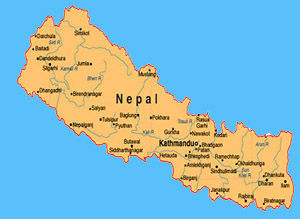Nepal ministers talk global warming in icy Everest heights
 Kathmandu, Dec 4 : Nepal's coalition government Friday basked in the global limelight with Prime Minister Madhav Kumar Nepal leading a historic meeting of his cabinet in the shadow of Mt Everest, the highest peak in the world, to draw the attention of nations to the perils of climate change.
Kathmandu, Dec 4 : Nepal's coalition government Friday basked in the global limelight with Prime Minister Madhav Kumar Nepal leading a historic meeting of his cabinet in the shadow of Mt Everest, the highest peak in the world, to draw the attention of nations to the perils of climate change.
For the first time in the history of Nepal, nearly two dozen ministers, wearing down jackets, blue sashes that said "Save the Himalayas" and oxygen masks, trooped to Kala Pattar, a village at 5,542 m, more than half-way to the Everest peak, to hold a sensational cabinet meet against a backdrop of towering mountains and thundering winds.
"It is a significant and historic meet," Nepal said, signing a 10-point Everest Declaration. "The world should unite with the Himalayan nations to raise one voice. Now is the time to stop the negative effects of climate warming. Let's start with sacrifices from our own countries."
As its own commitment, Nepal has declared nearly 6,000 sq km in three different regions, rich in bio-diversity, as conserved areas.
It will also stand behind the march of 30 Everest summiters who will stage a rally in Copenhagen Dec 11, in the course of the UN global conference on climate changes in the European capital, to ask the world to save the Himalayas.
The bleak plateau, surrounded by snow-clad mountains and bereft of vegetation, became the cynosure of all eyes Friday as the world waited for Nepal's government to begin its cabinet meeting near the Everest base camp.
A sign propped up between two national flags declared a cabinet meeting was in session with chairs lined up before narrow long tables.
The meeting, delayed by more than two hours, was preceded by the prime minister and his cabinet colleagues first alighting in Syangboche, a village located below the plateau, for health checks.
Helicopters belonging to the army and private airline companies then ferried the ministers to Kala Pattar where Chief Secretary Madhav Ghimire called the meeting to order, wielding a megaphone to make himself heard.
Though the much-awaited meeting lasted only 10 minutes, experts and travel entrepreneurs said it had succeeded in winning world recognition for Nepal, the Himalayas and the Sherpa community living in the Himalayan region.
The prime minister emphasised that Nepal, one of the least developed nations, was not guilty of carbon emissions that contribute to global warming.
Developed nations, he said, were responsible for the damage worldwide and therefore had a duty to come to the help of the victimised nations.
There are nearly 2,000 mountain lakes in Nepal, which boasts of eight of the 10 highest peaks in the world, including the Everest. Of these 2,000 lakes, 24 are in danger of bursting, experts say.
The global warming has been causing glaciers to retreat in the Himalayas and denuding the majestic peaks of their snow cover, making them look bare and smaller.
"When I climbed Mt Everest in 2007, I was shocked to see how bare it looked. There was little snow," said Sonam Sherpa.
"If the Himalayas die, all Nepalis will die," added Doti Sherpa, deputy chief of Nepal Sherpa Sangh. "It will devastate entire South Asia, not just Nepal."
Inspired by the Maldives government holding a cabinet meeting underwater, Nepal's Forest Minister Deepak Bohra conceived the idea of an "Everest" meet.
Nepal's cash-strapped government, accused of frittering away tax payers' money, spent only Nepali Re. 1 though the expedition cost over Rs. 6 million.
The entire expenses were borne by the private sector related to travel tourism.
After criticising it as a gimmick, there was grudging public admiration Friday due to the immense world interest the meeting generated.
Veteran journalist Kanak Mani Dixit welcomed the Everest meet cautiously.
"It is right to capitalise on the Himalayas," he said. "But to ensure that it is not a mere gimmick, there should be follow-up action."
Dixit, editor of Himal magazine, said that while the government was drawing attention to the adverse effects of global warming with the Everest meet, forests were being hacked down in Nepal's Terai plains. (IANS)